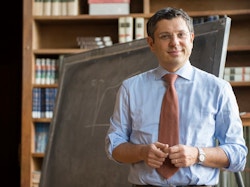The current Corona crisis requires us to be creative and innovative, for instance, by turning ‘mobility’ into ‘connectivity’. Francesco Ubertini, Rector of Università di Bologna, the first Una Europa partner affected by the crisis, has shared with us his views on student mobility of the future.
Do you expect student mobility to change in the Covid-19 aftermath?
One thing is sure: we will need to re-think mobility and adapt it according to how teaching activities have been re-organized in universities all over the world. Due to the covid-19 outbreak, universities in the Una Europa Alliance and elsewhere brought their teaching and training activities online in response to the restrictive measures imposed by heath and national authorities. This situation challenges us to re-imagine mobility models in a more sustainable and inclusive way, thus making this experience more impactful.
How would you describe Una Europa Alliance’s "virtual mobility" models?
With “virtual mobility” we want to experiment new models that would make mobility a more intercultural and inclusive experience. Indeed, even though Erasmus+ is an excellent programme, its funding does not cover all the costs incurred by students during their exchange abroad. Moreover, Erasmus+ is not as inclusive as we would like it to be, because often students with disabilities apply with less frequency for this kind of programmes.
Una Europa allows us to test new models of mobility and international connectivity that not only promote the intercultural experience but are also more inclusive in nature. This emergency linked to the Corona crisis provides even more momentum to “virtual mobility” models that are both sustainable and affordable. In other words, within our network we aim to make intercultural experiences possible for all our students, including those that are typically excluded from physical mobility programmes for personal, financial, or pandemic-related reasons.
Which models will you be developing together with the Una Europa partners?
We would like to explore three mobility models.
- The first model is based upon an entirely virtual mobility experience in which our students can select the classes they wish to attend at other Una Europa universities and obtain necessary credits.
- In the second model, we aim to develop "Joint Teaching Units", planned together by professors across the Una Europa universities and taught in the framework of the courses and degree programmes in our catalogues. Groups of students will be able to interact, thus shaping a sort of international virtual community with multilingual teaching and learning.
- The third model reflects our wish for normality to be restored. Following their virtual experiences in the first two models, we hope that students will have the chance to spend a short period of time at their host university, taking part in some extracurricular activities.
Our recent UNA.TEN initiative "Transform Emergency Now! 10 days for change" showed that international collaboration on joint student projects is a winning strategy that results in enthusiasm and impact among students, professors and stakeholders in our local community.
What are the greatest challenges you face as Una Europa in making the international experience a reality for students?
As we aim to open up the initiative to a wide range of students, we need to guide those who have never experienced classes at a different university in a different country and make sure that all students can actively participate in classes, even from a remote location.
Planning and developing the first Una Europa joint teaching activities will require us to embrace new themes and topics that go beyond the Una Europa Focus Areas. We should not rely too much on courses that are already taught in English at our universities. Rather, opening up courses that are now taught in our home languages to international students constitutes a powerful added value and drive towards our commitment to multilingualism.
More generally, we need to continue to highlight the plethora of opportunities that international experiences offer to our students. We acknowledge that the new “virtual mobility” models being tried and tested by Una Europa respond to an emergency situation, but, at the same time, we do think that the inclusive and sustainable nature of these models will bring very valuable lessons for scaling up in the future.



